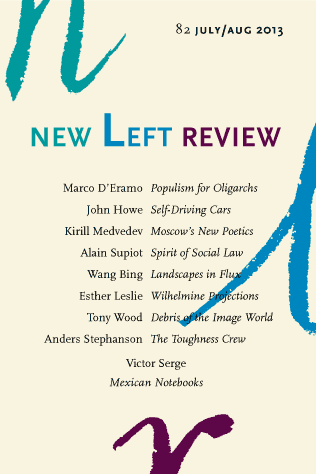Tracking the terms ‘populism’ and ‘the people’ from the 19th century, Marco D’Eramo offers a striking new interpretation of their current applications—the first levelled indiscriminately at any political force that steps outside the bounds of convention, the second banished from the scene.
Recently discovered diaries of the exiled novelist, with portraits of associates past and present, reflections on the Second World War, and vivid descriptions of the country where Serge lived out his final years.
After a long post-Soviet decade in which liberal ideas held sway, a new paradigm of politicized poetry has emerged in Russia. One of its leading leftist practitioners explores the tangled history of writing in a ‘civic’ mode, from Bolshevik revolution to resurgence under Putin.
The global auto industry, mired in over-capacity, is pinning its hopes on collaboration with Silicon Valley. John Howe runs a road-check on the virtues of electric engines, robotic parking and self-driving cars.
Kafka’s day job, defending injured factory workers, as starting point for an illuminating study of the West’s social-protection mechanisms. Mixed legacies and uncertain future of a system built to mitigate the tensions of industrialization.
The director of West of the Tracks discusses his upbringing between rural and urban worlds, his film education and his documentary practice. Epic portraits of China’s changing face, and of lives transformed by the gravitational pull of socio-economic laws.
Tony Wood on Hito Steyerl, The Wretched of the Screen. Dilemmas of representation—aesthetic and political—in the age of the super-abundant image.
Anders Stephanson on Peter Beinart, The Icarus Syndrome. American foreign policy from Wilson to Obama, through the spectacles of Niebuhrian realism.
Esther Leslie on John Phillip Short, Magic Lantern Empire. What role did popular visions play in fin-de-siècle German colonialism?
